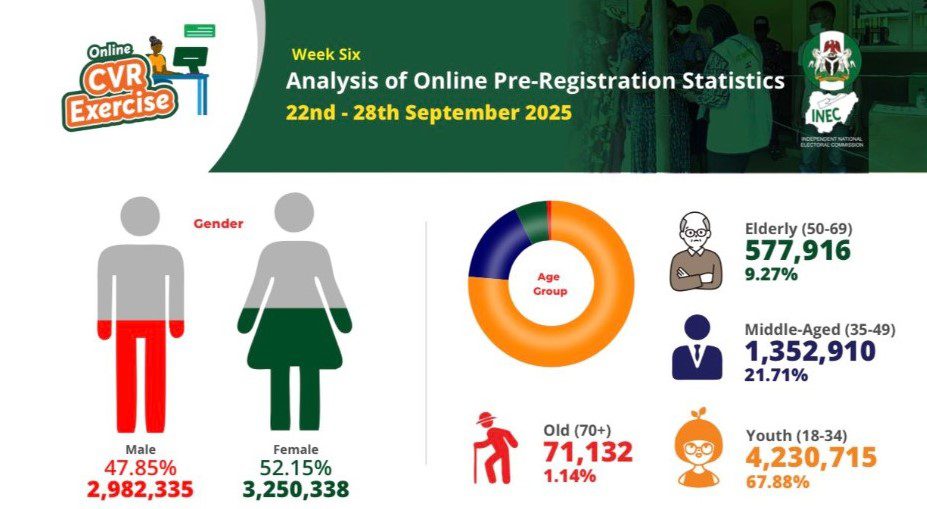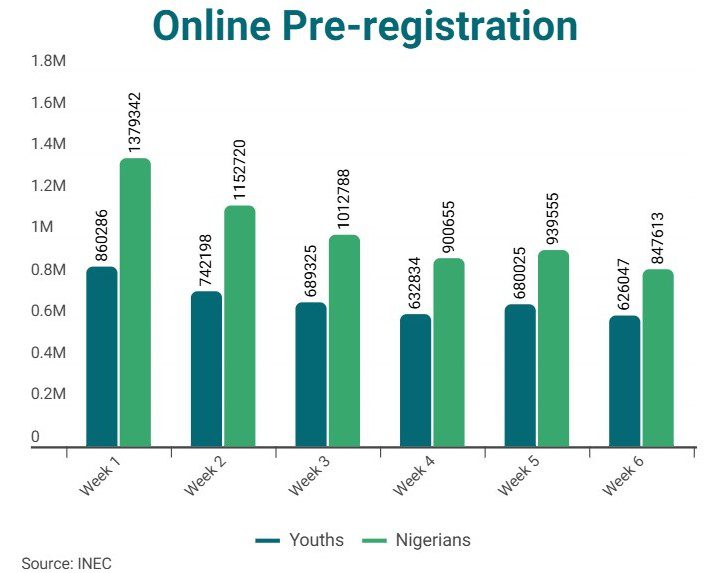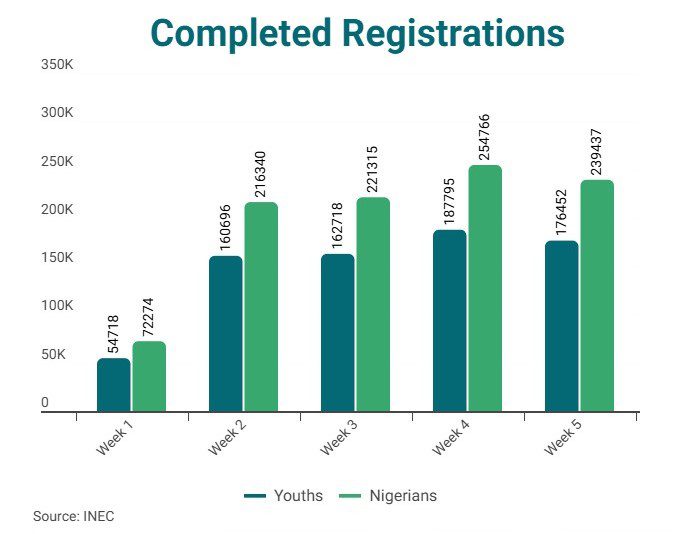







































With 4.2m online voters pre-registrations, do Nigerian youths still trust INEC?
 xPort
xPort
 PORTAL
PORTAL
 PORTAL
PORTAL
 WOULD
WOULD
Youth participation has been very high at the ongoing Independence National Electoral Commission (INEC) online pre-registration for the Continuous Voters Registration (CVR) phase. With 4.2 million youths already pre-registered online for voters’ cards, representing 68% of total registrations, Nigeria’s young people appear to be setting the pace and dictating the tune. However, there’s some concern that this might be a camouflage considering the continuous expression of the lack of trust in INEC’s integrity.
The 2023 General Elections, which saw increased youth engagement, were marred by serious irregularities. Even though the election was carried out with one of the most expensive electoral technologies in Africa, concerns were raised over the negative impact of technical glitches on the credibility of the results.
From the failures of the Bimodal Voter Accreditation System (BVAS) in accreditations to the crash of INEC’s Result Viewing Portal (IReV), the 2023 general elections were perceived as being far from free and fair. Also, the failures further led to a decline of trust in INEC’s ability to wholly represent the interests of Nigerians and live up to its independence.

Notably, experts believed outcomes of the 2023 general elections would harm future electoral participation. However, the increasing number of young people registering for the 2027 general elections states otherwise. Thus, is this sufficient evidence that the irregularities that marred the last general election are not leading to a decline in youth participation in the next election?
What is driving the numbers?
Beyond the numbers, Nigerian youths are positioning themselves to be the drivers of change and harbingers of revolution across the country.
Statistics show that over 60% of Nigeria’s population is under the age of 25. 70% are under 30 years old, and 42% are under age 15. This further shows that youths are a significant force capable of influencing outcomes. With Nigeria home to about 151 million young people, and a median age of 18.1, youths are beginning to place the burden of change on their shoulders.
At the bedrock of this drive is the high rate of youth internet adoption. As of early 2025, over 150 million Nigerians now have internet access, with youths within the age of 18-22 holding a significant share. The stack of youths’ online presence and adoption of the digital economy is a huge contributing factor to the weekly surge of the INEC numbers.
Another potential driver of this number is the youth’s desire to make a change. Undoubtedly, youths are beginning to create awareness and make use of the significant power they hold in the democratic process. With high rates of unemployment, insecurity challenges and economic downturns, youths’ participation in campaigns and election conversations has surged.

Activities such as the #EndSARS nationwide protests, the will of youths to hold political positions and the Labour Party-led Peter Obi in the last election were pivotal to this awakening. With their impacts playing a large role during the elections, youths will look to continue this movement in the 2027 elections.
Meanwhile, at this increasing number lie those who just want to possess a voter’s card, perhaps for identification purposes. Nigerians are known to possess the key to a door, yet refuse to make use of that tool. An overview of the last election further proved this. INEC revealed that 93.4 million registered for the 2023 general elections and 87.2 million picked up their permanent voters’ cards. Of this, only 25.3 million got accredited for the election.
Here’s another reference that numbers don’t equate to action.
There is a huge gap between the number of Nigerians/Youths who have pre-registered online and those who have completed their registration at INEC’s office. At week five, 1 million Nigerians/742k youths have completed their voter card registration, compared to the 6.2 million Nigerians/4.2 million youths who have pre-registered online as of week six.

Do Nigerian youths still trust INEC?
INEC has continued to boast about the high number of voter registrations as proof that Nigerians still have confidence in the electoral process.
The Chief Press Secretary to the INEC Chairman, Rotimi Oyekanmi, said assertions that citizens have lost confidence in Nigeria’s electoral system are baseless and unsupported by facts. According to him, the 6.2 million across 6 weeks is enough proof of the unwavering faith Nigerians have in the electoral process and its umpire.

For youths, the online pre-registration shows a level of interest and zeal to have a voice in shaping the future of Nigeria. However, issues with INEC’s performance, technical glitches, and its questionable credibility remain a concern.
The outcome of the last election was disputed in election tribunals, with accusations of electoral fraud and mismanagement. The INEC struggled with the electronic transmission of votes, issues with BVAS and IReV, triggering distrust in the transparency and fairness of the polls.
And that election saw youths make up around 76% of newly registered voters, with 40% of that number identified as students. Undoubtedly, the current statistics are an indication of interest
Take aways
- Nigerian youths’ internet adoption rate and desire for change are notable drivers of the 4.2 million online pre-registration.
- With the online pre-registration open till December, the numbers are expected to increase in the coming weeks.
- While concerns still surround INEC’s credibility and failure to prove its competence, young people want to place themselves at the helm of decision-making.
- The gap between the numbers of online pre-registration and complete registration is a concern, and this is coming from a previously known trend.

Considering INEC’s inconsistencies, Nigerians have little hope in its ability to conduct a credible election. While youths are conscious of this, it’s safe to say that the will to drive change and the flexibility of the online model are contributing significantly to the numbers.

